人教版英语八年级下unit3讲解与练习
人教版英语八年级下册单元知识点总结及同步练习 Unit3--4单元(无答案)
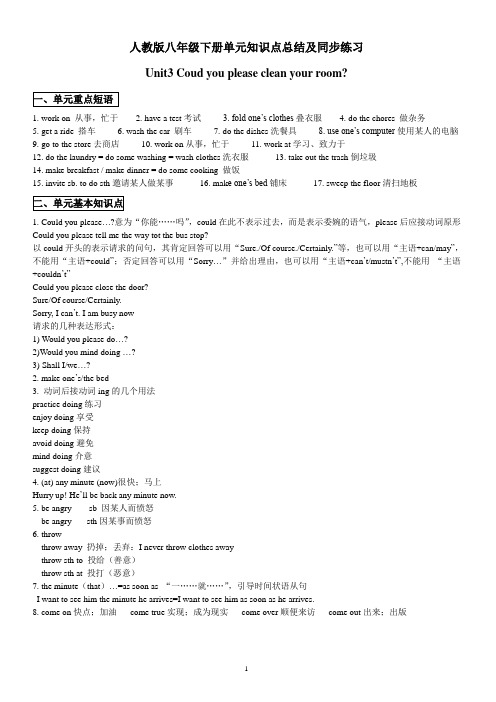
人教版八年级下册单元知识点总结及同步练习Unit3 Coud you please clean your room?1. work on 从事,忙于2. have a test考试3. fold one’s clothes叠衣服4. do the chores 做杂务5. get a ride 搭车6. wash the car 刷车7. do the dishes洗餐具8. use one’s computer使用某人的电脑9. go to the store去商店10. work on从事,忙于11. work at学习、致力于12. do the laundry = do some washing = wash clothes洗衣服13. take out the trash倒垃圾14. make breakfast / make dinner = do some cooking 做饭15. invite sb. to do sth邀请某人做某事16. mak e one’s bed铺床17. sweep the floor清扫地板1. Could you please…?意为“你能……吗”,could在此不表示过去,而是表示委婉的语气,please后应接动词原形Could you please tell me the way tot the bus stop?以could开头的表示请求的问句,其肯定回答可以用“Sure./Of course./Certainly.”等,也可以用“主语+can/may”,不能用“主语+could”;否定回答可以用“Sorry…”并给出理由,也可以用“主语+can’t/mustn’t”,不能用“主语+couldn’t”Could you please close the door?Sure/Of course/Certainly.Sorry, I can’t. I am busy now请求的几种表达形式:1) Would you please do…?2)Would you mind doing …?3) Shall I/we…?2. make one’s/the bed_________________3. 动词后接动词ing的几个用法practice doing练习enjoy doing享受keep doing保持avoid doing避免mind doing介意suggest doing建议4. (at) any minute (now)很快;马上Hurry up! He’ll be back any minute now.5. be angry ___ sb 因某人而愤怒be angry ___sth因某事而愤怒6. throwthrow away 扔掉;丢弃:I never throw clothes awaythrow sth to 投给(善意)throw sth at 投打(恶意)7. the minute(that)…=as soon as “一……就……”,引导时间状语从句I want to see him the minute he arrives=I want to see him as soon as he arrives.8. come on快点;加油come true实现;成为现实come over顺便来访come out出来;出版9. reply to sb/sth对某人/某物做出回答或反应10. all the time频繁;反复, 常常位于句末,强调在某段时间内一直进行或发生某事I have a dog and a cat, but they fight all the time.11. as…as…像……一样……表示两者在某方面程度相同,第一个as是副词,后应该跟形容词或副词的原级,第二个as是介词,后可跟名词,代词拓展:as…as…的否定形式是not as/so…as…“不如……;不与……一样”He studies as hard as his bother.He doesn’t study as/so hard as his brother12. neither1)neither did I 是“neither+be动词/助动词/情态动词+主语”结构,表示前者的否定情况也适用于后者。
新目标人教版英语八年级下册unit3知识点+练习题

新目标人教版英语八年级下册u n i t3知识点+练习题-CAL-FENGHAI.-(YICAI)-Company One1Unit3 Could you please clean your room?Section A(1a-2d)学习目标:1.掌握1a-2d的词语2.学习提出礼貌的请求和请求允许;3.学会使用句型:Could you please...和Could I...;4.学习重点:掌握一些家务活动相关的动词短语。
掌握情态动词could的用法和助动词do的用法。
5.学习难点:掌握情态动词could的用法和助动词do的用法【一】自主学习明确目标1 试读单词,解决语音问题,联系有关旧单词2 查阅下面的短语动词1) 出去吃饭_______________ 2)在外面待到很晚_______________3)去看电影_______________ 4)搭车_______________5)完成做某事_______________ 6)干净整洁_______________ 7)洗餐具_______________ 8)倒垃圾_______________9)叠衣服_______________ 10)扫地_______________ 3.观察以上词组的构成方式:【语言点】1. —Peter, could you please take out the trash请你把垃极倒掉好吗—Sure, Mom.可以,妈妈。
—Could you please do the dishes 请洗盘子好吗—Sorry, I can’t. I have to do my homework.抱歉,我不能。
我得做作业。
(1)在表示请求帮助或请求允许的疑问句中,常用could代替can,以表示礼貌,委婉或不确定的语气,而can则不具备这些语气。
这种情况下不能把could看作can的过去式。
以上两句中用could是为了表示礼貌的请求。
英语人教版新目标八年级下册第三单元Unit-3复习讲义

新目标八年级下册Unit 3 Could you please clean your room?一、词性转换Section A1. sweep → (pt.)swept2. throw → (pt.) threw3. fold→ (pt.) folded Section B1. lend → (pt.) lent2. hate → (pt.) hated3. stress → (v.) stress4. waste → (v.) waste5. provide → (pt.) provided6. depend→ (pt.)depended7. independence →(adj.) independent8. fairness → (adj.) fair9. unfair →(反义词)fair二、短语归纳1. do the dishes 洗餐具2. take out the rubbish倒垃圾3. fold your clothes叠衣服4. sweep the floor 扫地5. make your/the bed 整理床铺6. go out for dinner 出去吃饭7. throw down 扔下8.in surprise 惊讶地9. hang out 闲逛10. hate to do sth. 讨厌做某事11. do chores 做杂务12. enough stress足够的压力13. in order to为了14. provide sth. for sb.向某人提供某物15. get good grades取得好成绩16. mind doing sth. 介意做某事17. depend on依赖;依靠18. look after 照顾,照看19. keep it clean and tidy保持它干净整洁20. get into 进入21. take care of 照顾22. as a result 结果23. do one’ s part in (doing )sth. 做某人分内的事24. get a ride 搭车25.stay out late在外面待到很晚三、句型集萃1. Could you please help out with a few things? 你能帮忙做些事情吗?2.Mom will be back from shopping at any minute now. And she won’t be happy if she sees this mess.妈妈现在随时都会购物回来,如果她看到这些一团糟,会不高兴的。
人教版八年级英语下册 Unit 3 知识梳理及重难点讲练 (无答案)

人教新目标八年级英语下册Unit 3 单元知识梳理及重难点讲练知识梳理词汇:stress (n. 精神压力;心理负担) — stressed (adj. 有压力的)depend (v. 依靠;依赖) — dependent (adj. 依靠的) — dependence (n. 依赖) independent (adj. 独立的) — independence (n. 独立)fair (adj. 合理的;公正的) — fairness (n. 公正性;合理性)unfair (adj. 不合理的;不公正的) — unfairness (n. 不合理;不公正)neighbor (n. 邻居) — neighborhood (n. 社区)短语:do the dishes 洗餐具take out the rubbish 倒垃圾fold the clothes 叠衣服sweep the floor 扫地clean the living room 打扫客厅make the bed 铺床at least 至少;起码hang out 闲逛do chores 做家务throw down 扔下any minute now 随时,马上;在任何时候in surprise 惊讶地;吃惊地in a mess 杂乱不堪;陷入困境come over 过来;来访all the time 频繁;反复as soon as 一……就……the minute (that) —……就…… hate doing / to do sth. 讨厌做某事as...as... 像……一样…… a waste of 浪费……in order to 目的是;为了depend on 依靠;信赖have no idea 不知道in fairness 说句公道话take care of 照顾;处理as a result 结果fall ill 生病get a ride 搭车用法总结:Could you please...? 能请你……吗?finish doing sth. 完成做某事neither + be动词/ 助动词/ 情态动词+ 主语……也不make sb. (not) do sth. 使某人(不)做某事let sb. do sth. 让某人做某事spend time/money on sth. 在某事/物上花费时间/金钱provide sb. with sth.= provide sth. for sb. 为某人提供某物there is no need for sb. to do sth. 某人没有必要做某事The + 比较级,the + 比较级越……,越……do one's part in (doing) sth. 尽自己的职责做某事It + be + 名词(短语) + to do sth. 做某事是……It + be + 形容词+ for sb. to do sth. 对某人来说,做某事是……的。
人教版初中八年级英语下册第三单元Unit3教案含教学反思

⼈教版初中⼋年级英语下册第三单元Unit3教案含教学反思Section A 单词rubbish n.垃圾;废弃物fold v.折叠;对折sweep v.(swept)扫;打扫floor n.地板mess n.杂乱;不整洁throw v.(threw)扔;掷neither adv.也不; pron.两者都不shirt n.衬衫pass v.给;递;⾛过;通过borrow v.借;借⽤lend v.(lent)借给;借出finger n.⼿指hate v.厌恶;讨厌while conj.与……同时;当……的时候;⽽;然⽽chore n.杂务;乏味⽆聊的⼯作snack n.点⼼;⼩吃;快餐短语take out the rubbish 倒垃圾all the time频繁;反复as soon as ⼀……就……句型1.Peter,could you please take out the rubbish? 彼得,你能把垃圾倒了吗?2.And she won’t be happy if she sees this mess.⽽且如果她看到这么乱,她会不⾼兴的。
3.Could I at least finish watching this show?⾄少等我看完这个节⽬可以吗?4.For one week, she did not do any housework and neither did I.在—周时间⾥,她没有做任何家务,我也没有做。
that everyone should do their part in keeping it clean and tidy.既然他们和⽗母⽣活在同⼀所房⼦⾥,他们就应该知道每个⼈都应该为保持房屋的⼲净和整洁尽⼀份⼒。
5.The earlier kids learn to be independent,the better it is for their future.孩⼦们越早学会独⽴,对他们的未来就越好。
初中英语人教新目标八年级下册Unit 3 SectionA预习指导(知识点+练习题)
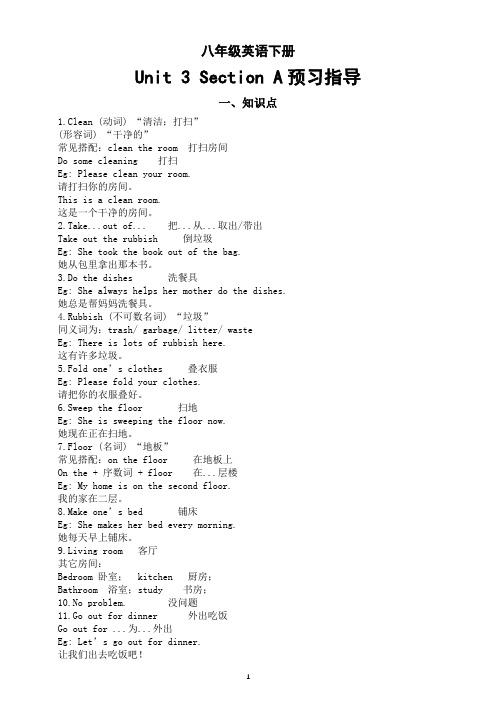
八年级英语下册Unit 3 Section A预习指导一、知识点1.Clean (动词) “清洁;打扫”(形容词) “干净的”常见搭配:clean the room 打扫房间Do some cleaning 打扫Eg: Please clean your room.请打扫你的房间。
This is a clean room.这是一个干净的房间。
2.Take...out of... 把...从...取出/带出Take out the rubbish 倒垃圾Eg: She took the book out of the bag.她从包里拿出那本书。
3.Do the dishes 洗餐具Eg: She always helps her mother do the dishes.她总是帮妈妈洗餐具。
4.Rubbish (不可数名词) “垃圾”同义词为:trash/ garbage/ litter/ wasteEg: There is lots of rubbish here.这有许多垃圾。
5.Fold one’s clothes 叠衣服Eg: Please fold your clothes.请把你的衣服叠好。
6.Sweep the floor 扫地Eg: She is sweeping the floor now.她现在正在扫地。
7.Floor (名词) “地板”常见搭配:on the floor 在地板上On the + 序数词 + floor 在...层楼Eg: My home is on the second floor.我的家在二层。
8.Make one’s bed 铺床Eg: She makes her bed every morning.她每天早上铺床。
9.Living room 客厅其它房间:Bedroom 卧室; kitchen 厨房;Bathroom 浴室;study 书房;10.No problem. 没问题11.Go out for dinner 外出吃饭Go out for ...为...外出Eg: Let’s go out for dinner.让我们出去吃饭吧!12.Go to the movies 去看电影类似词组:see the film 看电影Eg: They went to the movies last night.他们昨晚去看电影了。
人教版八年级英语下unit3重点短语及句型总汇+配套练习(附语法)

八年级下册复习学案Unit 3 What were you doing when the UFO arrived?一年级英语组吕书林一.重点短语1.in front of 在,,的前面(外部)in the front of 在,,的前面(内部)2.sleep late 睡懒觉sleep well 睡得好get to sleep=fall asleep 睡着3.walk down/along 沿,,走4.take off (飞机)起飞;脱下(衣帽)5.run away 跑开,逃跑6.buy/draw/make sth. for sb. 为某人买/画/制作7.in history 在历史上8.take place 发生(强调必然性)9.happen to sth./sb. 发生(强调偶然性)例如:What has happened to you?=What’s the matter with you?=What’s wrong with you?10.all over the world=around the world 遍及全世界11.next to 相邻,紧贴12.close to 接近于;在附近13.be ill in hospital/bed 生病住院/在床14.hear about/of 听说(间接听到)15.in silence 沉默不语keep silent 保持沉默16.an unusual experience 一次不寻常的经历17.have difficulty doing sth 干某事有困难18.have meaning to 对….有意义本单元目标句型:..?1.What were you doing when…2.I was doing sth. When+一般过去时的时间状语从句...3.While sth./sb. was doing sth., I was doing sth....Eg. What were you doing when the UFO landed?当不明飞行物着陆时,你正在干啥?While my mother was cooking, I was watching TV.当妈妈正在做饭时,我在看电视。
人教版初中英语八年级下册Unit3 课文讲解知识点及练习
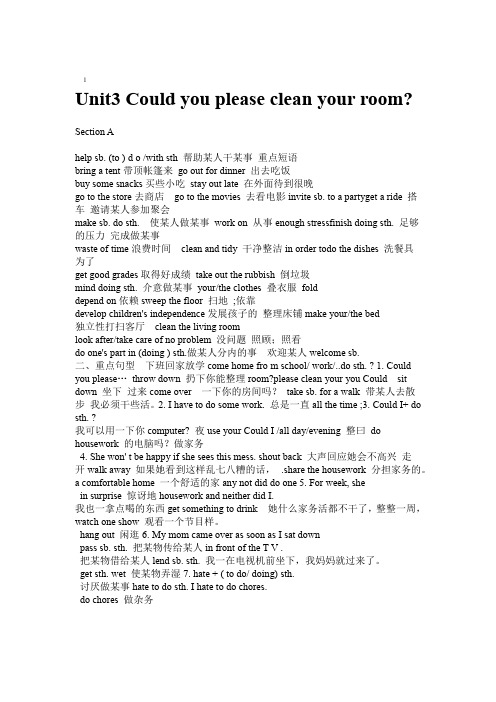
1Unit3 Could you please clean your room? Section Ahelp sb. (to ) d o /with sth 帮助某人干某事重点短语bring a tent带顶帐篷来go out for dinner 出去吃饭buy some snacks买些小吃stay out late 在外面待到很晚go to the store去商店go to the movies 去看电影invite sb. to a partyget a ride 搭车邀请某人参加聚会make sb. do sth. 使某人做某事work on 从事enough stressfinish doing sth. 足够的压力完成做某事waste of time浪费时间clean and tidy 干净整洁in order todo the dishes 洗餐具为了get good grades取得好成绩take out the rubbish 倒垃圾mind doing sth. 介意做某事your/the clothes 叠衣服folddepend on依赖sweep the floor 扫地;依靠develop children's independence发展孩子的整理床铺make your/the bed独立性打扫客厅clean the living roomlook after/take care of no problem 没问题照顾;照看do one's part in (doing ) sth.做某人分内的事欢迎某人welcome sb.二、重点句型下班回家放学come home fro m school/ work/..do sth. ? 1. Could you please…throw down 扔下你能整理room?please clean your you Could sit down 坐下过来come over 一下你的房间吗?take sb. for a walk 带某人去散步我必须干些活。
(精品)人教版英语八年级下unit3讲解与练习

Unit 3 Could you please clean your room?Section A1.Few, a few, little, a littleFew 几乎没有+可数名词复数There are few people in the room.Little 几乎没有+ 不可数名词There was little rain all winter.A few 少数,几个+ 可数名词复数He left his house a few minutes ago.A little 一点,少许+ 不可数名词Could you give me a little milk?【例】The girl in purple is new here, so ______ people know her.A. fewB. a fewC. littleD. a little2. solve vt. 解答,解决Few students can solve the physics problem.problem 指客观存在的等待解决的“问题”,着重困难;e.g.: The students are working on a math problem.question 指对某事怀疑因而提出等待回答的“问题”,着重疑惑和不能断定e.g.: The students are asking the teacher some questions.3. For one week, she didn’t do any housework and neither did I.“neither + be动词/ 助动词/ 情态动词+主语”表示“也不”。
e.g.: He doesn’t like swimming and neither do I.知识扩展:neither作代词,意为“(两者)都不”e.g.: Neither of my parents is at home.neither作形容词,与名词单数连用,意为“(两者)都不的”e.g.: Neither answer is right.意为“既不……也不……”neither… nor…e.g.: The room is neither big nor bright.典型例题:I can’t play the piano, and ______.A. neither can my sisterB. my sister can’t, too.C. so can’t my sisterD. can my sister, either4. Finally, I could not find a clean dish or a clean shirt.or 连词意为“也不”,表示并列关系,常用于否定句,连接并列的词或短语。
人教版八年级下unit3单元同步课时习题
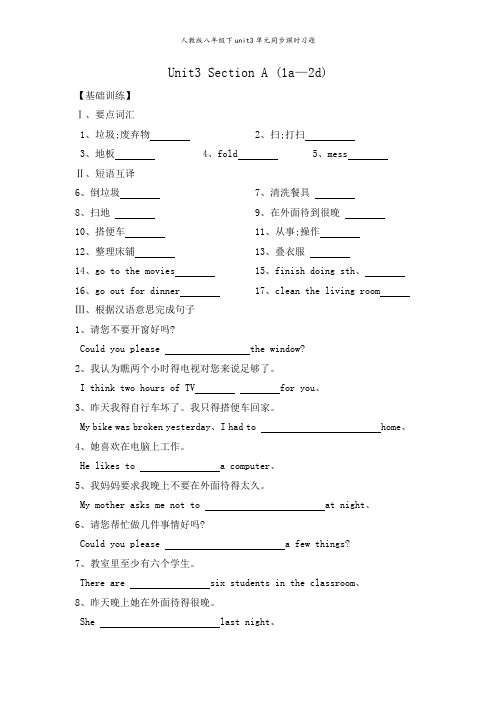
Unit3 Section A (1a—2d)【基础训练】Ⅰ、要点词汇1、垃圾;废弃物2、扫;打扫3、地板4、fold5、messⅡ、短语互译6、倒垃圾7、清洗餐具8、扫地 9、在外面待到很晚10、搭便车 11、从事;操作12、整理床铺 13、叠衣服14、go to the movies 15、finish doing sth、16、go out for dinner 17、clean the living roomⅢ、根据汉语意思完成句子1、请您不要开窗好吗?Could you please the window?2、我认为瞧两个小时得电视对您来说足够了。
I think two hours of TV for you、3、昨天我得自行车坏了。
我只得搭便车回家。
My bike was broken yesterday、I had to home、4、她喜欢在电脑上工作。
He likes to a computer、5、我妈妈要求我晚上不要在外面待得太久。
My mother asks me not to at night、6、请您帮忙做几件事情好吗?Could you please a few things?7、教室里至少有六个学生。
There are six students in the classroom、8、昨天晚上她在外面待得很晚。
She last night、9、劳驾,先生。
我可以搭便车吗?Excuse me,sir、Could I ?10、半小时后妈妈会买东西回来。
Mother will in half an hour、11、彼得,请您把垃圾倒掉好吗?Peter, take out the rubbish?12、我可以出去吃饭吗?go out for dinner?13、—我可以用您得电脑吗?—对不起。
我正打算用它。
—use your computer?—Sorry、I’m going to it、【综合运用】Ⅰ、用所给词得适当形式填空1、—Could you please (help) me clean the room?—Yes,sure、2、—Could I (play) computer games for a while,Mom?—Yes,you can,but you first need (finish) your homework、3、I guess Mom will be angry if she (see) the mess、4、They are watching TV in the (live) room、5、I often do the (dish) at home、6、Did you finish (watch) this show?7、I’ll go to the park if it (not rain) tomorrow、8、Could you please (make) the bed?9、He doesn’t want you (play) computer games、10、Two kilometers (be) not far、Let’s go there by bike、Ⅱ、单项选择( )11、Mom,the clothes are dry、Could you help me them?A、makeB、foldC、doD、wash( )12、—Could you please sweep the floor?—、I’m busy babysitting my sister、A、Sorry,I can’tB、Yes,sureC、Yes,I canD、Sorry,you can’t( )13、—Ted,could you please the rubbish?—Of course,Mom、A、take afterB、take offC、take outD、take care of( )14、Mrs、Zhao went after she finished her work last Monday、A、shop,doingB、shopping,doingC、shopping,to doD、shop,do ( )15、I’ll go fishing with my father tomorrow、But if it ,I’ll stay at home and help my mother with housework、A、will rainB、is rainingC、rainsD、rainUnit 3 Section A (3a—4c)【基础训练】Ⅰ、要点词汇1、扔;掷2、也不;两者都不3、衬衫4、给;递5、借给;借出6、手指7、borrow 8、hate 9、whileⅡ、短语互译10、一……就……;尽快 11、闲逛12、生某人得气 13、惊奇地14、总就是;一直 15、扔下16、过来 17、hate to do sth、18、sit down 19、pass sb、sth、20、lend sb、sth、Ⅲ、根据汉语意思完成句子1、借给我一些钱好吗?Could you some money?2、昨天我从图书馆借了一本书。
人教版八年级下册英语Unit3 重点词汇讲解练习
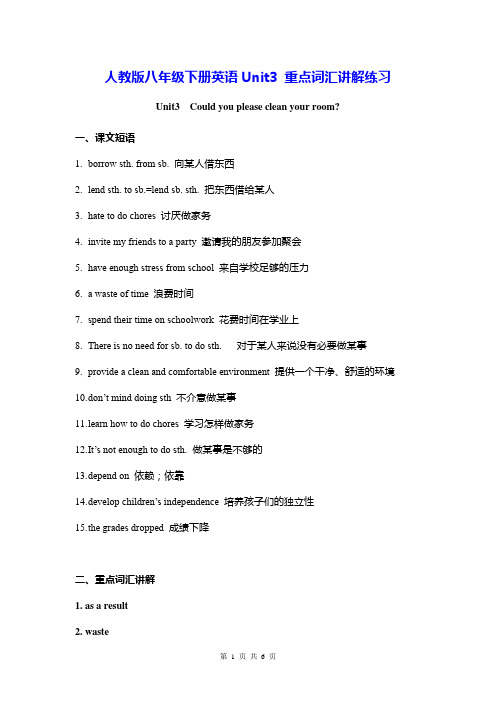
人教版八年级下册英语Unit3 重点词汇讲解练习Unit3 Could you please clean your room?一、课文短语1.borrow sth. from sb. 向某人借东西2.lend sth. to sb.=lend sb. sth. 把东西借给某人3.hate to do chores 讨厌做家务4.invite my friends to a party 邀请我的朋友参加聚会5.have enough stress from school 来自学校足够的压力6. a waste of time 浪费时间7.spend their time on schoolwork 花费时间在学业上8.There is no need for sb. to do sth. 对于某人来说没有必要做某事9.provide a clean and comfortable environment 提供一个干净、舒适的环境10.d on’t mind doing sth 不介意做某事11.l earn how to do chores 学习怎样做家务12.I t’s not enough to do sth. 做某事是不够的13.d epend on 依赖;依靠14.d evelop children’s independence 培养孩子们的独立性15.t he grades dropped 成绩下降二、重点词汇讲解1. as a result2. waste3. pass4. borrow&lend5. depend6. while7. provide讲解版1. as a resultas a result意为“因此;结果”as a result of意为“由于……;作为……的结果”2. wastewaste 作不可数名词,意为“浪费,废物,垃圾”。
waste 作及物动词,意为“浪费”。
人教版 八年级英语 下册 Unit3Could_you_please_clean_your_room
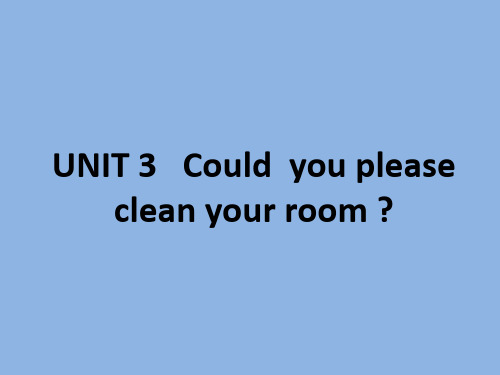
invite my friends to a party
go to the store use your CD player
Listen to a conversation between Sandy
a party? Parent: No, you can’t have a party.
You have a test on Monday.
Parent: Could you please…? Child: Yes, sure. / Sorry, I can’t. I
have to ...
clean your room
parents
5. go to the store 6. use your CD player 7. take out the rubbish
parents 8. make your bed
1b Use the phrases in 1a to make
conversations.
Parent: Could you clean your room? Child: Yes, I can. Child: Could I invite my friends to
Li Lei can’t dance , neither can I. neither can Mary. neither can we.
Neither of …是both of … 的否定句 Both of my parents are teathers .(否定句) Neither of my parents is a teacher .
人教版八年级下册英语 Unit 3 单元知识点总结(含练习题及答案)
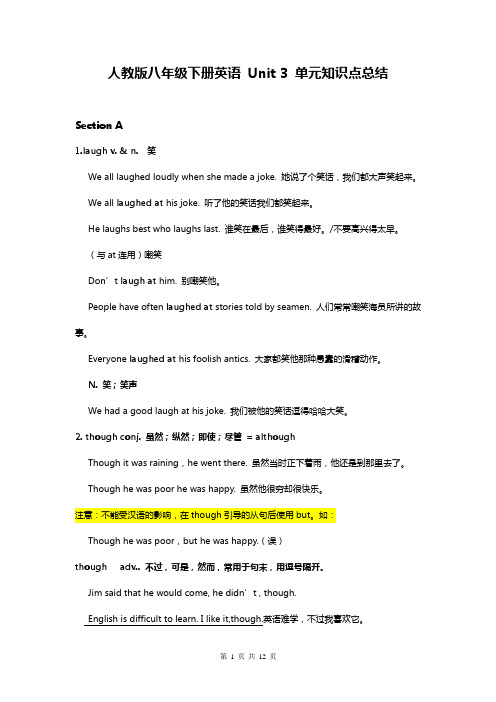
人教版八年级下册英语Unit 3 单元知识点总结Section Augh v. & n. 笑We all laughed loudly when she made a joke. 她说了个笑话,我们都大声笑起来。
We all laughed at his joke. 听了他的笑话我们都笑起来。
He laughs best who laughs last. 谁笑在最后,谁笑得最好。
/不要高兴得太早。
(与at连用)嘲笑Don’t laugh at him. 别嘲笑他。
People have often laughed at stories told by seamen. 人们常常嘲笑海员所讲的故事。
Everyone laughed at his foolish antics. 大家都笑他那种愚蠢的滑稽动作。
N. 笑;笑声We had a good laugh at his joke. 我们被他的笑话逗得哈哈大笑。
2. though conj. 虽然;纵然;即使;尽管= althoughThough it was raining,he went there. 虽然当时正下着雨,他还是到那里去了。
Though he was poor he was happy. 虽然他很穷却很快乐。
注意:不能受汉语的影响,在though引导的从句后使用but。
如:Though he was poor,but he was happy.(误)though adv.. 不过,可是,然而,常用于句末,用逗号隔开。
Jim said that he would come, he didn’t , though.English is difficult to learn. I like it,though.英语难学,不过我喜欢它。
3. quietly轻声地,安静地,平静地quiet轻声的,安静的,平静的The students walked to a quiet place.同学们向一个安静的地方走去。
2020年人教版八年级下册英语Unit 3阅读写作专题训练(含解析和答题技巧)
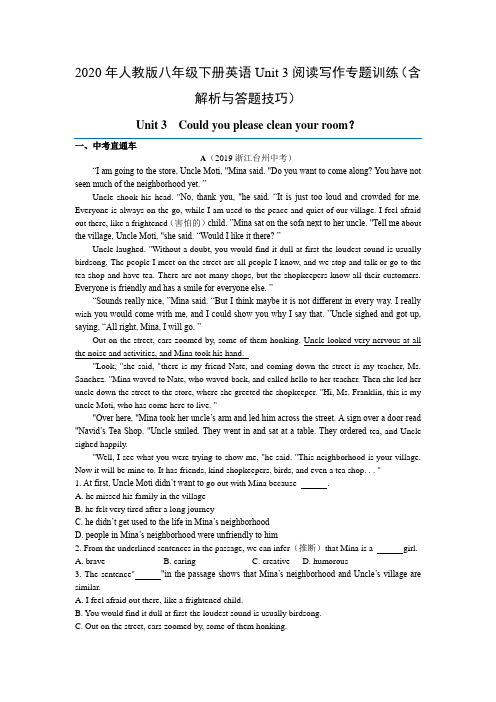
2020年人教版八年级下册英语Unit 3阅读写作专题训练(含解析与答题技巧)Unit 3 Could you please clean your room?一、中考直通车A(2019浙江台州中考)“I am going to the store, Uncle Moti, "Mina said. "Do you want to come along? You have not seen much of the neighborhood yet. ”Uncle shook his head. "No, thank you, "he said. “It is just too loud and crowded for me. Everyone is always on the go, while I am used to the peace and quiet of our village. I feel afraid out there, like a frightened(害怕的)child. ”Mina sat on the sofa next to her uncle. "Tell me a bout the village, Uncle Moti, "she said. “Would I like it there? ”Uncle laughed. "Without a doubt, you would find it dull at first-the loudest sound is usually birdsong. The people I meet on the street are all people I know, and we stop and talk or go to the tea shop and have tea. There are not many shops, but the shopkeepers know all their customers. Everyone is friendly and has a smile for everyone else. ”“Sounds really nice, ”Mina said. “But I think maybe it is not different in every way. I really wish you would come with me, and I could show you why I say that. ”Uncle sighed and got up, saying, “All right, Mina, I will go. ”Out on the street, cars zoomed by, some of them honking. Uncle looked very nervous at all the noise and activities, and Mina took his hand."Look, "she said, "there is my friend Nate, and coming down the street is my teacher, Ms. Sanchez. "Mina waved to Nate, who waved back, and called hello to her teacher. Then she led her uncle down the street to the store, where she greeted the shopkeeper. "Hi, Ms. Franklin, this is my uncle Moti, who has come here to live. ""Over here, "Mina took her uncle’s arm and led him across the street. A sign over a door read "Navid’s Tea Shop. "Uncle smiled. They went in and sat at a table. They ordered tea, and Uncle sighed happily."Well, I see what you were trying to show me, "he said. "This neighborhood is your village. Now it will be mine to. It has friends, kind shopkeepers, birds, and even a tea shop. . . "1. At first, Uncle Moti didn’t want to go out with Mina because .A. he missed his family in the villageB. he felt very tired after a long journeyC. he didn’t get used to the life in Mina’s neighborhoodD. people in Mina’s neighborhood were unfriendly to him2. From the underlined sentences in the passage, we can infer(推断)that Mina is a girl.A. braveB. caringC. creativeD. humorous3. The sentence" "in the passage shows that Mina’s neighborhood and Uncle’s village are similar.A. I feel afraid out there, like a frightened child.B. You would find it dull at first-the loudest sound is usually birdsong.C. Out on the street, cars zoomed by, some of them honking.D. It has friends, kind shopkeepers, birds, and even a tea shop.4. The story suggests that Uncle Moti will probably later on.A. still feel frightened as beforeB. start to look for a job in a tea shopC. be willing to go out in Mina’s neighborhoodD. tell people why he came to Mina’s neighborhoodB(2019聊城中考)完形填空(共10小题; 每小题1分, 满分10分)What do you do in your free time? Surf the Internet? Watch TV? For 15-year-old Wang Yan, her free time is not 1 at all. Wang Yan has a special family. Her mother can't 2 and has to stay in bed all day, and her father can't see. So the family roles are 3 . Instead of parents taking care of their child, Wang Yan has to take care of her parents. From the age of 6, Wang Yan began to cook and wash clothes for the whole family.Now Wang Yan is a 9th grade student in a school. The school is far from her home, 4 she has to live at school. At school she studies very hard and every 5 she comes back home and helps her parents. Being a care-giver, she cooks, washes clothes and gives her parents massages(被摩), As the only laborer(劳力)in the family, she does a lot of 6 work-weeding(除草), watering the field, growing vegetables. She 7 has a busy weekend.Though the girl lives a hard life, she never feels 8 . As for the future, Wang Yan hopes to go to college and then become a 9 , “If I can go to college, I w ill take my parents with me, “she said. “And I want to be a doctor one day. Then I will be able to help the disabled(残疾人)like my 10 . “1. A. busy B. relaxing C. different2. A. walk B. run C. jump. A. lost B. continued C. changed4. A. so B. but C. or5. A. day B. night C. weekend6. A. farm B. factory C. school7. A. never B. seldom C. always8. A. happy B. sad C. comfortable9. A. writer B. doctor C. singer10. A. parents B. teachers C. classmates二、完形填空·链接课文体裁:议论文词数:176 难度:★☆☆The Sunday Mail magazine interviewed some parents about whether children should do chores at home. Different people have different ideas.Ms. Miller thinks that kids these days already have enough 1 from school. They do not have time to do housework. Housework is a 2 of their time. They should spend their time on schoolwork 3 get good grades and get into a good university. When kids get older, they will have to do housework. So there is no need for them to do it now. She thinks that doing 4 is not so difficult.However, Mr. Smith disagrees with her. He thinks it is important for children 5 how to do chores and help their parents with housework. It’s not enough to just get good grades at school. Children these days 6 their parents too much. Doing chores helps to 7 children’s i ndependence and teaches them how to look after themselves. It also helps them to understand the idea of 8. Everyoneshould do their part in 9 the house clean and tidy. The earlier kids learn to be 10, the better it is for their future.( )1. A. time B. stress C. work D. things( )2. A. need B. fun C. hate D. waste( )3. A. so that B. in order to C. that D. such( )4. A. homework B. cleaning C. chores D. work( )5. A. learn B. to learn C. learns D. learning( )6. A. join in B. depend on C. live on D. care about( )7. A. change B. pass C. develop D. control( )8. A. fairness B. independence C. training D. difficulty( )9. A. keeps B. kept C. keep D. keeping( )10. A. independent B. fair C. clever D. hard-working二、阅读集训阅读理解 A体裁:夹叙夹议词数:196+157 难度:★☆☆建议用时:5分钟正确率:/5Should we teenagers help our parents do chores? Is it important for us to learn how to do chores? I think both answers are “Yes”.Most teenagers like us are the only child in the family. Our parents love us very much. They have done eve rything well for us and don’t want us to do any chores. I think it’s bad for us. The following is a real story.I have a classmate called Li Qing. She is the only child in her family, like me. Her parents love her so much that they don’t let her do any cho res. Every day she only has meals, goes to school, does her homework and goes to bed. So she doesn’t know how to do chores. One day, her father was badly ill and had an operation(手术) in the hospital. Her mother had to take care of him in the hospital and c ouldn’t cook for Li Qing for a week. Li Qing didn’t know how to cook meals. She had only instant(即食的) noodles for her meals.From this story we can learn how important it is for us to learn to do chores and otherskills(技能) besides(除了) study.( )1. The writer thinks it is for teenagers to learn to do chores.A. wrongB. importantC. interestingD. boring( )2. Most teenagers according to the passage.A. don’t go to schoolB. have instant noodles for mealsC. are the only child in the familyD. do most of the chores in the family( )3. How long may Li Qing’s father have stayed in the hospital?A. For seven days.B. For three days.C. For two days.D. For four days.( )4. Li Qing had only instant noodles for her meals when her parents weren’t at home bec ause .A. her parents didn’t give her enough moneyB. she didn’t enjoy making mealsC. she liked eating instant noodles very muchD. she didn’t know how to cook meals( )5. Which of the following is NOT true?A. Li Qing’s grandmother looked after her when her father was ill in hospital.B. Li Qing has no brothers or sisters.C. Li Qing is a girl student.D. The writer and Li Qing are classmates.阅读理解 B体裁:应用文词数:133+128 难度:★☆☆建议用时:5分钟正确率:/5Giving children chores to do at home can help them to play an important part in family life. Younger children often love the chance to help with simple chores. But when they get older, they may not like to do them! What chores do children in Western countries do? You can find the answer in the following “Age Appropriate Chores Chart”.( )1. This passage is about the chores children in ____ can do at home.A. ChinaB. Western countriesC. AmericaD. Australia( )2. Children at the age of three can do some chores such as ____.A. making the bedB. cleaning their roomsC. helping to cook a mealD. taking care of pets( )3. 14-year-old children can do many kinds of chores except(除了) _____.A. doing their own washingB. cleaning their roomsC. cleaning the houseD. going to work( )4. Children at the ages of 9-12 can _____ .A. do their own washingB. clean their roomsC. help in the gardenD. clean the house( )5. Children should do chores at home because it can ____.A. make themselves healthierB. make their parents happyC. help them relax themselvesD. help them to play an important part in family life阅读理解 C体裁:议论文词数:210+166 难度:★★☆建议用时:6分钟正确率:/5In China, some parents do almost everything for their children these days. They look on their older children or sometimes even adults as babies! It is a very common problem in China, because most parents only have one child.Some parents don’t let children do chores or go anywhere by themselves. As a result, their children can’t do anything by themselves and have to depend more on them.In fact, no children really enjoy being looked after by their parents all the time. No parents would be happy to know that. As a result of too much care, their children don’t know anything about the world! Children need their own time to grow into adults and to learn how to deal with problems. Too much care spoils(破坏) their fun when they are growing up. And when suddenly they can’t depend on their parents, these children may be in great trouble.It is nice that parents show their care to their children; it is nice that children know that their parents’ love is out of love, and it will be nicer if the children let their parents know how much love they really need, and how much love is too much.( )1. In the passage, the common problem in China is ____.A. parents only have one childB. older children or even adults look like babiesC. parents do almost everything for their childrenD. parents don’t really love their children( )2. Children can’t do anything by themselves because _____ .A. they are too lazy to learn anythingB. they like to depend on their parentsC. their parents give them too much careD. they are too young( )3. What does the underlined phrase “deal with” mean in this passage in Chinese?A. 处理B. 面对C. 提出D. 遇到( )4. What does the writer want to tell us?A. Children should depend on their parents.B. Parents should teach their children everything.C. Parents’ too much love is not good for their children.D. Children need to know their parents love them.( )5. What’s the best title for the passage?A. Help your childrenB. We don’t need loveC. Children are always childrenD. Children are no longer babies阅读理解 D体裁:说明文词数:256 难度:★★★建议用时:7分钟正确率:/5阅读短文,从短文后的五个选项中选出能填入空白处的最佳选项,每个选项只能用一次。
人教版八年级英语下册-Unit-3-Could-you-please-clean-your-room-重点词组+重点句型+重点语法+综合练习题
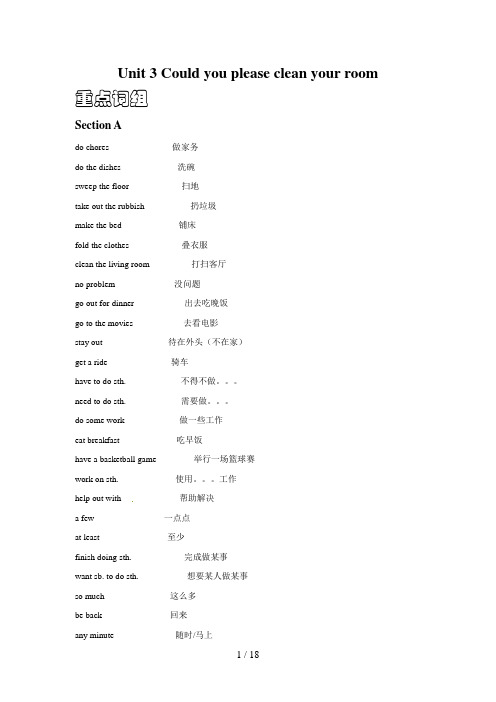
Unit 3 Could you please clean your room 重点词组Section Ado chores 做家务do the dishes 洗碗sweep the floor 扫地take out the rubbish 扔垃圾make the bed 铺床fold the clothes 叠衣服clean the living room 打扫客厅no problem 没问题go out for dinner 出去吃晚饭go to the movies 去看电影stay out 待在外头(不在家)get a ride 骑车have to do sth. 不得不做。
need to do sth. 需要做。
do some work 做一些工作eat breakfast 吃早饭have a basketball game 举行一场篮球赛work on sth. 使用。
工作help out with 帮助解决a few 一点点at least 至少finish doing sth. 完成做某事want sb. to do sth. 想要某人做某事so much 这么多be back 回来any minute 随时/马上clean and tidy 干净整洁be angry with 对某人生气solve the problem 解决问题throw down 扔下in front of 在。
前面come over 过来take...for a walk 带。
去散步all the time 一直all day 整个白天do housework 做家务all evening 整个夜晚shout back 吼叫还击walk away 走开come home from work 下班回家in surprise 惊讶地share the housework 分担家务sit down 坐下hang out 出去玩help sb. (to) do sth. 帮助某人做某事how much 多少come back 回来try (not) to do sth. 努力(不)做某事hate to do sth. 讨厌做某事Section Bask sb. to do sth. 让某人做某事next to 靠近have a party 参加派对have a test 参加考试mean doing sth. 意味着。
Unit 3知识点精析(下)+课文注释人教版英语八年级下册

人教版丨初中英语八年级下册Unit 3知识点精析(下)+课文注释1.invite my friends to a party邀请我的朋友们来参加聚会要点精析invite为及物动词,意为“邀请”。
invite sb.to do sth.意为“邀请某人做某事”。
例:We invited all our friends.我们邀请了我们所有的朋友。
Kate invited me to go to the movies with her.凯特邀请我和她一起去看电影。
知识拓展invite 的名词形式为invitation,意为“邀请;请帖”。
例:Thank you for your kind invitation.谢谢你的盛情邀请。
2. I do not understand why some parents make their kids help with housework and chores at home.我不理解为什么一些父母让他们的孩子在家帮忙做家务。
要点精析make their kids help with housework and chores 是 make sb. do sth.结构,此结构意为“让/使某人做某事”。
例:This good news made her laugh happily.这个好消息使她开心地笑了。
3.Housework is a waste of their time.(做)家务是浪费他们的时间。
要点精析a waste of...意为“浪费……”,其中waste是名词,意为“浪费;滥用”。
例:Playing computer games is a waste of time.玩电脑游戏是浪费时间的。
知识拓展waste还可作动词,意为“浪费”。
例:Don't waste your money on clothes.别把你的钱浪费在衣服上。
4. They should spend their time on schoolwork in order to get good grades and get into a good university.为了取得好成绩,进入一所好大学,他们应该把他们的时间花在学业上。
Unit 3 短语知识点归纳练习 人教版英语八年级下册
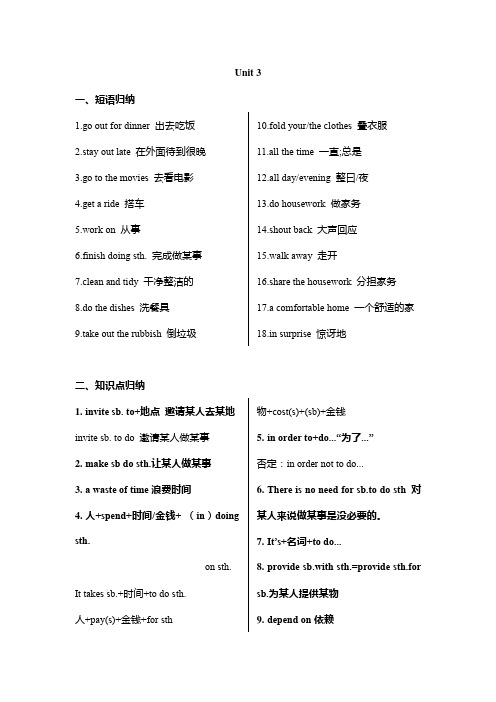
Unit 3 一、短语归纳1.go out for dinner 出去吃饭2.stay out late 在外面待到很晚3.go to the movies 去看电影4.get a ride 搭车5.work on 从事6.finish doing sth. 完成做某事7.clean and tidy 干净整洁的8.do the dishes 洗餐具9.take out the rubbish 倒垃圾10.fold your/the clothes 叠衣服11.all the time 一直;总是12.all day/evening 整曰/夜13.do housework 做家务14.shout back 大声回应15.walk away 走开16.share the housework 分担家务17.a comfortable home 一个舒适的家18.in surprise 惊讶地二、知识点归纳1.invite sb. to+地点邀请某人去某地invite sb. to do 邀请某人做某事2.make sb do sth.让某人做某事3.a waste of time浪费时间4.人+spend+时间/金钱+ (in)doing sth.on sth. It takes sb.+时间+to do sth.人+pay(s)+金钱+for sth 物+cost(s)+(sb)+金钱5.in order to+do...“为了...”否定:in order not to do...6.There is no need for sb.to do sth 对某人来说做某事是没必要的。
7.It’s+名词+to do...8.provide sb.with sth.=provide sth.for sb.为某人提供某物9.depend on依赖10.be always doing总是做某事,常表达说话人的某种情绪,如赞扬、不满、责备等11.develop v.发展development n.发展12.do one’s part in doing 在...尽职责13.as a result结果14.fall ill生病fall asleep入睡15.take care of照顾=look after=care for16.The+比较级...the+比较级... 越...越...17.fair adj.公平的(反)unfair adj.不公平的fairness n.公正性、合理性练习一、单项选择1.Could you please ________the rubbish here?A.don't put B.not to put C.not putD.to not put 2.23. It is necessary for us students the listening ability.A.to improve B.improving C.improveD.improves 3.My father often listens to the radio he is driving.A.until B.because C.while D.where 4.Jack can't play the piano. _______.A.So can I B.So I can C.Neither can I D.Neither I can 5.—Would you mind my sitting here?—_______.A.Never mind B.No, of course notC.Yes, I would D.I'm sorry to hear that6. It’s nice of you to______ so much time showing me around your school.A. takeB. spendC. costD. have7. All of us find _______ necessary to take exercise every day .A. thisB. thatC. themD. it8. The new kind of car is ______ dear, I don’t have ______money.A. too much: much tooB. much too: too muchC. too much: too muchD. much too: much too9. — There is some rubbish here. Please ______.A. take it outB. take out itC. take them outD. take out them10. — Excuse me , Peter. There is something wrong with my car. Could I ______ ?— Yes, sure.A. go for a driveB. go for a walkC. have a driveD. get a ride二、阅读Do teenagers in small villages do chores at home? How about the teenagers in big cities? Here is a survey. We asked 4,000 teenagers in China several questions. Half of them come from big cities like Beijing, Shanghai and Guangzhou. The others are from small villages. We made a diagram of the result of our survey. Let’s have a look at it. We found out that teenagers from small villages do more chores than those from big cities. Maybe it is because they live a harder life. Our advice to parents in big cities is that parents should give their children some chores to do. Doing chores teaches teenagers to take care of themselves.1.They surveyed ______ teenagers from small villages.A.1,000B.2,000C.3,000D.4,000 2.There are 1,000 teenagers from the cities who ______.A.take out the trashB.do the dishesC.make the bedD.fold the clothes3.Fewer than ______ teenagers in big cities sweep the floor and make the bed. A.500B.1,000C.1,500D.2,0004.The number of teenagers ______ in big cities is bigger than that in small villages. A.making the bedB.taking out the trashC.folding the clothesD.doing the dishes5.Why did they make the survey?A.Because they don’t want teenagers in China to do chores at home. B.Because they thought it will help teenagers to take good care of themselves to dochores.C.Because they wanted to know if teenagers in China do chores at home. D.Because they thought it is not necessary for teenagers to look after themselves.三、用所给词的适当形式填空1. The teacher often tells us not _____________ (not surf) the Internet.2. Come on! I have something important to _____________ (tell) you.3. I haven’t decided when to _____________ (take) a holiday yet.4. To _____________ (be) healthy, we should eat more vegetables and fruits.5. My job is to _____________ (study) hard.6.It’s not enough for students to just get good ________ (grade) at school. 7.I’m trying to sleep. Would you mind ________ (turn) down the music? 8.The fourth day of July is the National ________ (independent) Day of the US. 9.Doing chores can help children understand the idea of ________ (fair). 10.Our country is ________ (develop) very quickly now.四、根据汉语意思完成句子1.为了通过考试,他每天都努力学习。
2011级人教版八年级下册英语_Unit3_第三单元笔记+练习
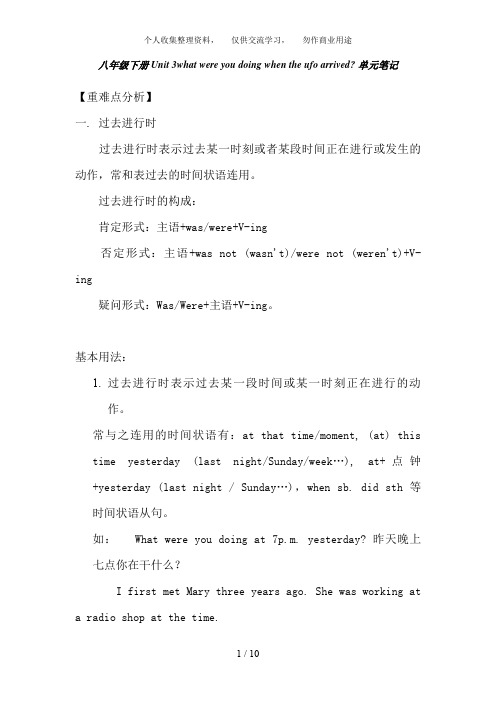
八年级下册Unit 3what were you doing when the ufo arrived? 单元笔记【重难点分析】一. 过去进行时过去进行时表示过去某一时刻或者某段时间正在进行或发生的动作,常和表过去的时间状语连用。
过去进行时的构成:肯定形式:主语+was/were+V-ing否定形式:主语+was not (wasn't)/were not (weren't)+V-ing疑问形式:Was/Were+主语+V-ing。
基本用法:1.过去进行时表示过去某一段时间或某一时刻正在进行的动作。
常与之连用的时间状语有:at that time/moment, (at) this time yesterday (last night/Sunday/week…), at+点钟+yesterday (last night / Sunday…),when sb. did sth等时间状语从句。
如: What were you doing at 7p.m. yesterday? 昨天晚上七点你在干什么?I first met Mary three years ago. She was working ata radio shop at the time.我第一次遇到玛丽是在三年前,当时她在一家无线电商店工作。
I was cooking when she knocked at the door. 她敲门时我正在做饭。
2. when后通常用表示暂短性动词,while后通常用表示持续性动词,因此它所引导的状语从句中,谓语动词常用进行时态,如:When the car exploded I was walking past it.= WhileI was walking past the car it exploded.3.when用作并列连词时,主句常用进行时态,从句则用一般过去时,表示主句动作发生的过程中,另一个意想不到的动作发生了。
人教版八年级下册英语Unit3重难点总结及练习(含部分答案)
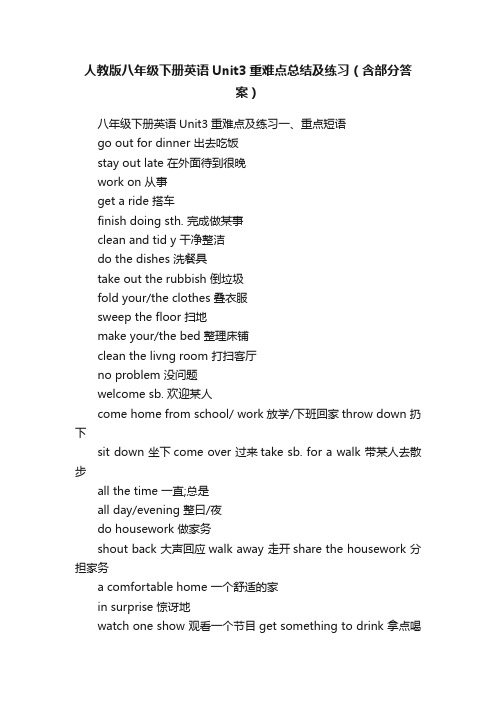
人教版八年级下册英语Unit3重难点总结及练习(含部分答案)八年级下册英语Unit3重难点及练习一、重点短语go out for dinner 出去吃饭stay out late 在外面待到很晚work on 从事get a ride 搭车finish doing sth. 完成做某事clean and tid y 干净整洁do the dishes 洗餐具take out the rubbish 倒垃圾fold your/the clothes 叠衣服sweep the floor 扫地make your/the bed 整理床铺clean the livng room 打扫客厅no problem 没问题welcome sb. 欢迎某人come home from school/ work放学/下班回家throw down 扔下sit down 坐下come over 过来take sb. for a walk 带某人去散步all the time 一直;总是all day/evening 整曰/夜do housework 做家务shout back 大声回应walk away 走开share the housework 分担家务a comfortable home 一个舒适的家in surprise 惊讶地watch one show 观看一个节目get something to drink 拿点喝的东西hang out 闲逛pass sb. sth. 把某物传给某人lend sb. sth. 把某物借给某人get sth. wet 使某物弄湿hate to do sth. 讨厌做某事do chores 做杂务help sb. (to ) d o /with sth?帮助某人干某事bring a tent带顶帐篷来buy some snacks买些小吃go to the store去商店invite sb. to a party邀请某人参加聚会make sb. do sth. 使某人做某事enough stress足够的压力a waste of time浪费时间in order to为了get good grades取得好成绩mind doing sth. 介意做某事depend on依赖;依靠develop children ’ s independence发展孩子的独立性look after/take care of 照顾;照看do one’ s part in (doing ) sth.做某人分内的事二、重点难点讲解:Section A1.Could you please do sth ?请你(做)......好吗?Could I do sth? 我可以做......吗?用于提出请求,希望得到对方的肯定回答,说话的语气比较客气委婉。
Unit3基础梳理、基础测试及专项练习 2022-2023学年人教版英语八年级下册

八下英语Unit3基础知识短语归纳1.do chores=do housework做家务2.do/ wash the dishes洗餐具3.take out the rubbish倒垃圾4.fold the clothes叠衣服5.sweep the floor扫地6.make the bed铺床7.clean the living room打扫起居室8.go out(for)(为……)外出9.stay out待在外面;不在家10. get a ride搭车11. work on从事;创作12. help out with帮助做13. throw down扔下14. sit down坐下15. come over过来;顺便来访16. take... for a walk带…去散步17. hang out闲逛18. pass sb. sth.= pass sth.to sb.递给某人某物19. spend on 在…上花费(时间或金钱)20. get good grades取得好成绩21. provide sth. for sb. provide sb. with sth.为某人提供某物22. depend on依靠;信赖23. look after= take care of照顾;照料24. keep it clean and tidy保持它干净、整洁25. get into进入26. fall ill生病27.be angry about sth.因某事生气be angry with sb.生某人的气28. at least至少29. in front of在前面30. in surprise吃惊地;惊讶地31. as soon as立刻32. as a result结果33. a waste of time浪费时间34. all the time频繁;反复用法集萃1. finish doing sth. 完成做某事mind doing sth. 介意做某事2.want(sb.) to do sth.想要(某人)做某事3.as+形容词/副词原级+as与…一样4. Neither+连系动词be/助动词/情态动词+主语......也不5. try(not) to do sth.尽力(不)做某事try doing sth.尝试做某事6. hate to do sth.hate doing sth.厌恶做某事7. make sb. do sth.让/使某人做某事let sb. do sth.让某人做某事8. have time to do sth.有时间做某事9. in order(not) to do sth.为了(不)做某事10. spend. doing sth.花费……做某事11.It is enough to do sth.做某事就足够了。
- 1、下载文档前请自行甄别文档内容的完整性,平台不提供额外的编辑、内容补充、找答案等附加服务。
- 2、"仅部分预览"的文档,不可在线预览部分如存在完整性等问题,可反馈申请退款(可完整预览的文档不适用该条件!)。
- 3、如文档侵犯您的权益,请联系客服反馈,我们会尽快为您处理(人工客服工作时间:9:00-18:30)。
Unit 3 Could you please clean your room? Section A1.Few, a few, little, a littleFew 几乎没有+可数名词复数There are few people in the room. Little 几乎没有+ 不可数名词There was little rain all winter.A few 少数,几个+ 可数名词复数He left his house a few minutes ago.A little 一点,少许+ 不可数名词Could you give me a little milk?【例】The girl in purple is new here, so ______ people know her.A. fewB. a fewC. littleD. a little2. solve vt. 解答,解决Few students can solve the physics problem.problem 指客观存在的等待解决的“问题”,着重困难;e.g.: The students are working on a math problem.question 指对某事怀疑因而提出等待回答的“问题”,着重疑惑和不能断定e.g.: The students are asking the teacher some questions.3. For one week, she didn’t do any housework and neither did I.“neither + be动词/ 助动词/ 情态动词+主语”表示“也不”。
e.g.: He doesn’t like swimming and neither do I.知识扩展:neither作代词,意为“(两者)都不”e.g.: Neither of my parents is at home.neither作形容词,与名词单数连用,意为“(两者)都不的”e.g.: Neither answer is right.neither… nor…意为“既不……也不……”e.g.: The room is neither big nor bright.典型例题:I can’t play the piano, and ______.A. neither can my sisterB. my sister can’t, too.C. so can’t my sisterD. can my sister, either4. Finally, I could not find a clean dish or a clean shirt.or 连词意为“也不”,表示并列关系,常用于否定句,连接并列的词或短语。
e.g.: He can’t read or write.表示选择关系,用于陈述句,意为“或,或者”;用于疑问句中,意为“还是”e.g.: Answer yes or no.Is your bag red or black?表示转折关系,意为“否则,要不然”e.g.: Hurry up, or you’ll be late.5. My mom came over as soon as I sat down in front of the TV.as soon as “一……就……”,引导时间状语从句e.g.: He left as soon as h heard the news.【辨析】in front of与in the front of区别in front of “在……的前面”,是指在一定范围外e.g.: Mary is in front of the car.in the front of “在……的前部”,是指在一定范围内e.g.: Cathy is in the front of the car.7. pass vt. 传递pass sb. sth.= pass sth. to sb. 递给某人某物e.g.: Please pass me a towel.=8. lend, borrow和keep的区别lend vt. (过去式、过去分词lent)借给,借出常用短语:lend sb. sth.= lend sth. to sb. 借给某人某物延续性e.g.: Jack lent his book to Mary last week.borrow vt. 借,借用常用短语:borrow sb. sth. = borrow sth. from sb. 向某人借某物非延续性e.g.: Sam borrowed a car from his friend.keep vt. 延续性动词;保持,保存延续性e.g.: Mary may keep the book for two weeks.典型例题:-- Can I ______ your bike?-- With pleasure. But you mustn’t _______ it to others.A.lend; borrowB. borrow; lendC. lend; lendD. borrow; borrowSection B9.waste n. 不可数浪费,废物,垃圾e.g.: I hate waste.固定结构:a waste of time 浪费时间adj. 无用的,浪费的,荒废的e.g.: We shouldn’t throw waste paper about.vt. 浪费e.g.: People shouldn’t waste food.10. 四种“花费”(1) spend vt. 指花费时间、金钱或精力;主语为人。
结构:sb. spend time/ money on sth.= sb. spend time/ money (in) doing sth.e.g.: She spent 50 dollars on the skirt.(2) pay v. 指支付、花费金钱;主语为人。
结构:sb. pay (sb.) money (for sth.)e.g.: She paid 50, 000 dollars for the car.(3) cost v. 指花费金钱、精力等;主语为物。
结构:sth. costs (sb.) money.e.g.: The house cost them a lot of money.(4) take v. 指花费时间。
结构:It takes sb. time to do sth. it为形式主语e.g.: It took him three weeks to finish the work.11. provide vt. 提供,供给结构:provide sth. for sb. = provide sb. with sth. 为某人提供某物e.g.: He has to provide food and clothes for his family.习语:It all depends. That depends. 视情况而定。
12. since 连词自……以后;自……以来,引导时间状语从句e.g.: It is two years since we visited your mother.由为,既然,引导原因状语从句e.g.: Since we don’t have money, we can’t buy a house.13. As a result, he often fell ill and his grades dropped.as a result 习惯用语,意为“结果,因此”e.g.: As a result, we had to change our plan.as a result of 由于……,作为……的结果e.g.: He was late as a result of snow.此处fall(fell, fallen) 为联系动词“进入某种状态;变成”Finally she fell silent.【辨析】fall ill 与be illFall ill “生病” 一时动作非延续He fell ill last week.Be ill “生病” 状态延续He has been ill for a week.Conclusion of the unit1. do the dishes 洗餐具2. take out the rubbish 倒垃圾3. go out 出去4. help out 帮助做完某事5. at least 至少6. in surprise 惊讶地7. throw down 扔下8. all the time 频繁,反复9. spend… on…在……花费(时间或金钱)10. as soon as 一……就……11. in order to 为了12. provide sth. for sb. = provide sb. with sth. 为某人提供某物13. depend on 依赖,信赖14. look after = take care of 照顾,照看15. get into 进入16. as a result 结果,因此17 finish doing sth. 做完某事18. mind doing sth. 介意做某事19. learn how to do sth. 学会怎样做某事20. the+比较级,the+比较级越……就越……【Grammar】--情态动词could的用法情态动词could用于有礼貌地提出要求或请求准许,用于疑问句,代替can,在时间上与can没有区别,但语气要比can委婉、有礼貌。
回答时要用can,不能用could。
除此之外,肯定回答还可以用Sure./ Certainly./ Yes, sure./ No problem. /With pleasure.等;否定回答还可以用I'm afraid not.等⏹Could you please lend me your dictionary?⏹Yes, sure.Could的其他用法:(1) could为can的过去式,表示能力。
e.g.: He said that he couldn’t come.(2) 表示惊异、怀疑、不相信等态度,主要用于否定句和疑问句,此时could与can无时间上区别,但语气比can缓和,情绪要弱。
e.g.: He couldn’t / can’t be over fifty.(3) 表示可能性,指对将来、现在或过去某种可能的推测。
